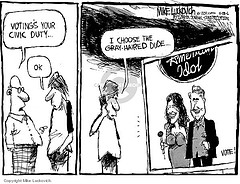The United States Constitution was signed on September 17, 1787.
 On June 21, 1788 it was ratified into law.
On June 21, 1788 it was ratified into law.
The American Democracy Project (ADP) is focused on higher education’s role in preparing the next generation of informed, engaged citizens. SUNY Fredonia is one of the 220 ADP participant colleges. As recipients of federal funding; the college is obligated to celebrate Constitution Day.
In previous years, discussion topics included the role of the Constitution in: the 2008 election, campaign finance laws, and Guantanamo Bay. This year students and professors shared thoughts on a lecture given by Supreme Court Associate Justice Anthony Kennedy at the Chautauqua Institution this summer.
“Why should a millennium generation care what the senior member of the senate thinks about the Constitution, or about a document that was written over 200 years ago?” moderator, Professor David Rankin asked the room full of students. The four student panelists Megan Mitchell, Kelly Tichacek, Hunter Benson, and John Waring sat in the front of the room, prepared with their answers to this question.
As a citizen of the United States, the Constitution entrusts us with two types of liberty; individual liberty and civic liberty. Individual liberty encapsulates the right to express yourself, the right to be free as an individual, to speak your mind, and think what you want. Civic liberty is the liberty of the society as a whole, what’s best for the group, and good for the greater good.
“I think that the idea of the greater good and the idea of our personal self interest have gone away from each other.” explained Megan, “Now what’s best for ourselves, or what we think is best for ourselves does not concern what’s best for everybody as a whole.”
Meghan explained in ensuing our liberties and our freedoms, we have the option of being virtuous citizens. Civic virtue is the moral underpinning of how a citizen behaves and is involved in society. A citizen deeply engaged in politics at the local, state, or national level is practicing great civic virtue. This individual’s actions are favorable to social harmony and group well being.
“Are these structures (the Constitution) conducive in encouraging public engagement?” asked Professor Jonathan Chausovsky, “…or would a different structure of Government lead to better civic engagement.” The panelists tried to explain whether the Constitution as a document promotes civic virtue, or if the virtuosity is in the hands of its citizens.
“Most people think of democracy in terms of freedoms; freedoms of religion, of speech, religion, right to bear arms, and the freedom to map out your destiny basically.” said Kelly Tichacek, “However, we always forget there is a second type of freedom. I believe it’s the most democratic freedom we have, and that’s the freedom to participate in government.”
Kelly expressed a cynical view of society’s participation in government. “Get involved, stay informed…a lack of participation only furthers feeling of dissatisfaction.” She believed that a democracy can only be democratic if its citizens exercise their rights mandated by the Constitution.
“If the general population disregards politics and government, it will end up being a system where the many are ruled by the few and that really doesn’t sound that democratic.” It isn’t the sole responsibility of the government to be democratic. Kelly says we need to work together as citizens to serve the common good rather than promote our own selfish interests.
Hunter took a slightly different stance on the role of civic virtue in the Constitution. “While people need to be more interested (in the government) I think it is also their right not to be, and we need to respect that because if we go too far into civic virtue we end up infringing on peoples rights.”
Hunter explained that politics can be boring and democracy is a slow process. So it’s hard for people to be interested in a process where it takes a long time to accomplish anything. “Individuals feel alienated and that their voice does not matter. And that is because it primarily doesn’t; one person’s voice really cannot change what people think without a lot of work, a lot of influence and a lot of time put into what they want to do.” John agreed, “It’s very daunting for one person to stand up by themselves. It’s almost impossible for one person to change the system.
It is the responsibility of the Constitution to provide its citizens two things. According to Hunter, “We need protection for the rights of the apathetic and an outlet for the enthusiastic. And I think we have both those things.” Therefore, our Constitution must not only provide means for civic engagement, but an option without consequence to remain uninvolved.
The Political Science Department will host a Convocation event titled “Dilemmas of Public Engagement with Detention and Rendition in post 9/11 America.” Panelists will address issues and problems of engagement in a democracy. The event will take place on Wednesday, October 21st in S-104 of the Williams Center.


 On June 21, 1788 it was ratified into law.
On June 21, 1788 it was ratified into law. On Tuesday September 8th, President Obama gave a
On Tuesday September 8th, President Obama gave a 